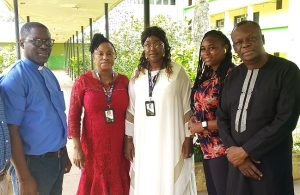The need for collaborative efforts to address the challenges of access to water was the core of discussions at the Nigeria Country Workshop on the Principles of Blue Community organised by the Africa Water Justice Network and the Ecumenical Water Network (EWN), Africa on Tuesday, October 15, 2024, in Ibadan, the Oyo State capital, Nigeria.

The event, which held at the Institute of Church and Society, Samonda in Ibadan, drew participants from civil society, youth groups, women leaders and faith-based groups who x-rayed the challenges of access to water and agreed to work together to challenge unjust laws that lead to the monopolisation of water by corporations.
In his welcome address, Coordinator of the Ecumenical Water Network (EWN) Africa, Reverend Kolade Fadahunsi, said the workshop was convened to educate communities and groups on the Blue Communities’ initiative and identify those that can be recruited to protect the human right to water.
Programme Executive/Coordinator, Ecumenical Water Network (EWN), Dinesh Suna, said that the EWN, based in Geneva, is an initiative of the World Council of Churches and comprises churches and church-related organisations that promote the preservation, responsible management and equitable distribution of water for all, based on the understanding that water is a gift from God, a common good and a fundamental human right.
Suna explained that, on October 25, 2016, the WCC became a Blue Community at a public event in Geneva and has since then been working with cities and villages, universities and schools, companies and NGO, faith-based organisations and trade unions that promote the human right to water and sanitation and to oppose privatization and commodification of water and its services.
The Blue Community was initiated by the Council of Canadians, a Canadian social and environmental justice organisation, and the Canadian Union of Public Employees (CUPE) in 2009 to help activists and decision-makers at the local level to stop the privatisation of municipal water services and promote the human right to water.
Suna said that the Blue Community work with governments, politicians, experts, journalists, activists and water operators to ensure water justice for all. The Blue Community network supports the Blue Communities in these efforts, helps to establish contacts among them and facilitates the exchange and cooperation.
Speaking on “Water Sustainability, Preservation and Protection”, Executive Director of Renevlyn Development Initiative (RDI), Philip Jakpor, said that the causes of water shortage include Geographic location, Climate change, Pollution, Unjust laws and policies that open the door for water grab and Lack of education/awareness on use of water.
Jakpor disclosed that in Nigeria there have been attempted water grabs through an International Monetary Fund (IFC) – Lagos Advisory Contract which would have paved the way for the privatisation of water resources in Lagos in 2013, a proposed Environment Law of Lagos State in 2017, and the National Water Resources Bill of 2018, among others, that stalled due to advocacy by civil society groups pushing for adoption of public sector solutions to Nigeria’s water crisis.
He revealed that the enablers of water privatisation include the World Bank and its business arm – the IFC, while the beneficiaries are corporations like Veolia and Suez that have merged into a single company, Abengoa, Metito and Nestle.
To confront the water grabs by the aforementioned corporations, he said that Blue Communities must advocate for the right legislation, public funding of water, communal efforts, education and personal efforts.
He also stressed the need for network building, street marches when the need arises, media advocacy for sensitisation and awareness targeting the masses, legislative advocacy which includes petitioning lawmakers and key agencies of government as well as use of social media which is a means of reaching and recruiting young people into water advocacy.
In her intervention, Professor Jacinta A. Opara, Vice Chancellor of the Dominican University, Ibadan, said that water is one of the most critical natural resources essential for life, economic growth, and environmental sustainability.
Professor Opara stressed that, as Nigeria’s population grows, the demand for water continues to increase, putting immense pressure on the country’s water resources, adding that climate change, industrialisation, and inadequate infrastructure have exacerbated water challenges in Nigeria.
She revealed that, in rural areas, the situation is even more precarious, with many communities relying on contaminated surface water, leading to waterborne diseases.
Listing the factors that contribute to the challenges in water sustainability in Nigeria, she said that pollution and environmental degradation tops them while other issues like poor Infrastructure and management closely follow. Others are climate change, deforestation and land use changes, and poor governance and regulatory frameworks.
The professor also itemised strategies for water preservation and protection which include strengthening water policies and regulations, improving water infrastructure, promoting integrated water resources management, community participation and education, and combating pollution and environmental degradation.
In his presentation on “Bottled Water’s Rising Toll on Planetary and Human Health”, Reverend Fadahunsi noted that approximately 1 million plastic bottles are purchased every minute globally, owing to the dependence of about 2 billion people on bottled water due to unsafe drinking water.
He lamented however that 80% of all bottled water plastics end in landfills with as much as 1.6 million tons of plastic waste also ending up in lakes, streams and rivers, and posing significant threat to the environment, public health, and social justice.
In his call to action, he said there was need for the Nigerian government to invest in reliable tap water infrastructure and promotion of tap water accessibility, and the need for restriction of single-use plastics.
He urged the participants to take the lead by shifting towards tap water consumption to address health, environmental, and social challenges.
